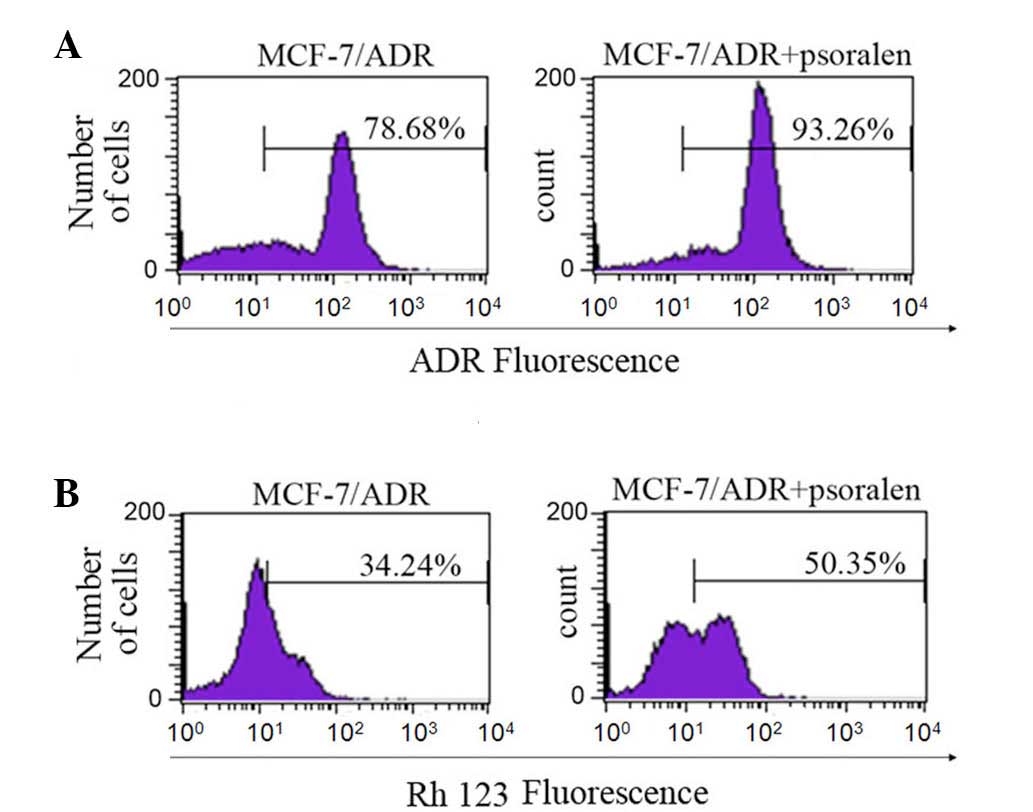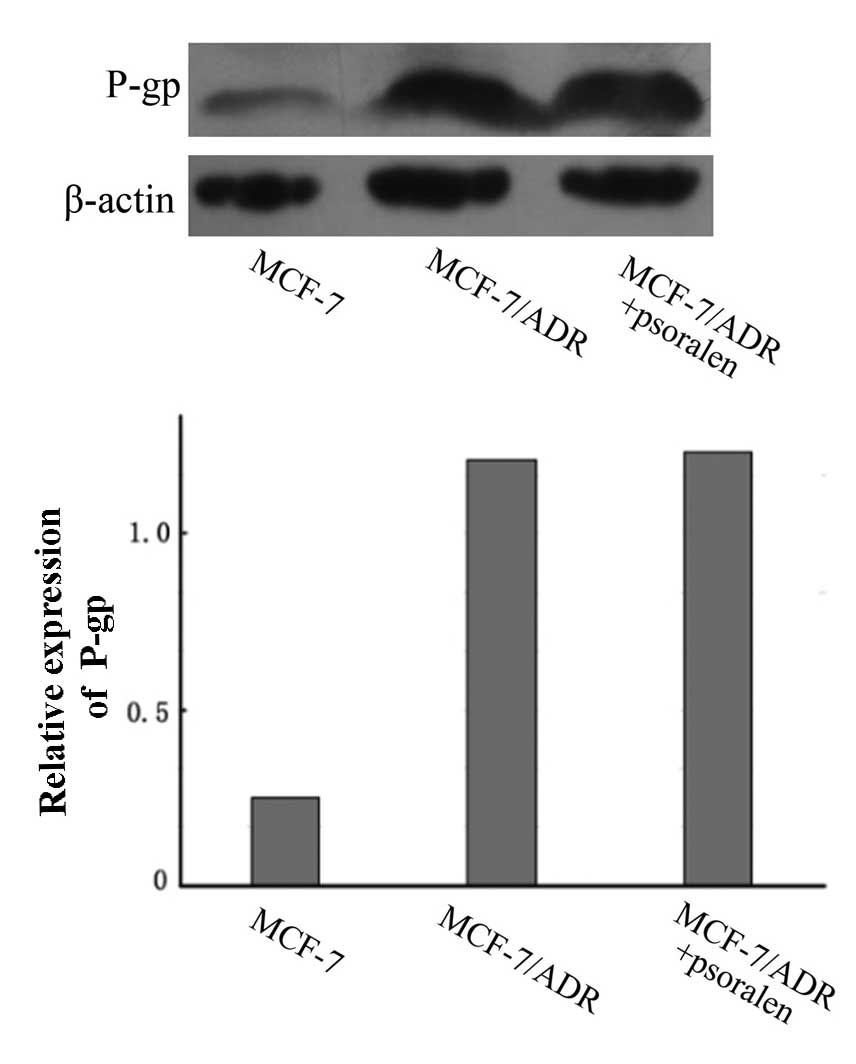|
1
|
Torre LA, Bray F, Siegel RL, Ferlay J,
Lortet-Tieulent J and Jemal A: Global cancer statistics, 2012. CA
Cancer J Clin. 65:87–108. 2015. View Article : Google Scholar : PubMed/NCBI
|
|
2
|
Li X, Xu H, Dai X, Zhu Z, Liu B and Lu X:
Enhanced in vitro and in vivo therapeutic efficacy of codrug-loaded
nanoparticles against liver cancer. Int J Nanomedicine.
7:5183–5190. 2012. View Article : Google Scholar : PubMed/NCBI
|
|
3
|
Cao X, Luo J, Gong T, Zhang ZR, Sun X and
Fu Y: Coencapsulated doxorubicin and bromotetrandrine lipid
nanoemulsions in reversing multidrug resistance in breast cancer in
vitro and in vivo. Mol Pharm. 12:274–286. 2015. View Article : Google Scholar
|
|
4
|
Shuhendler AJ, Cheung RY, Manias J, Connor
A, Rauth AM and Wu XY: A novel doxorubicin-mitomycin C
co-encapsulated nanoparticle formulation exhibits anti-cancer
synergy in multidrug resistant human breast cancer cells. Breast
Cancer Res Treat. 119:255–69. 2010. View Article : Google Scholar
|
|
5
|
Duan Z, Zhang J, Ye S, Shen J, Choy E,
Cote G, Harmon D, Mankin H, Hua Y, Zhang Y, et al: A-770041
reverses paclitaxel and doxorubicin resistance in osteosarcoma
cells. BMC Cancer. 14:6812014. View Article : Google Scholar : PubMed/NCBI
|
|
6
|
Susa M, Iyer AK, Ryu K, Choy E, Hornicek
FJ, Mankin H, Milane L, Amiji MM and Duan Z: Inhibition of ABCB1
(MDR1) expression by an siRNA nanoparticulate delivery system to
overcome drug resistance in osteosarcoma. PLoS One. 5:e107642010.
View Article : Google Scholar : PubMed/NCBI
|
|
7
|
Kobayashi E, Iyer AK, Hornicek FJ, Amiji
MM and Duan Z: Lipid-functionalized dextran nanosystems to overcome
multidrug resistance in cancer: A pilot study. Clin Orthop Relat
Res. 471:915–925. 2013. View Article : Google Scholar :
|
|
8
|
Brambilla D, Zamboni S, Federici C, Lugini
L, Lozupone F, De Milito A, Cecchetti S, Cianfriglia M and Fais S:
P-glycoprotein binds to ezrin at amino acid residues 149–242 in the
FERM domain and plays a key role in the multidrug resistance of
human osteosarcoma. Int J Cancer. 130:2824–2834. 2012. View Article : Google Scholar
|
|
9
|
Pakos EE and Ioannidis JP: The association
of P-glycoprotein with response to chemotherapy and clinical
outcome in patients with osteosarcoma. A meta-analysis. Cancer.
98:581–589. 2003. View Article : Google Scholar : PubMed/NCBI
|
|
10
|
Schneiderman RS, Shmueli E, Kirson ED and
Palti Y: TTFields alone and in combination with chemotherapeutic
agents effectively reduce the viability of MDR cell sub-lines that
over-express ABC transporters. BMC Cancer. 10:2292010. View Article : Google Scholar : PubMed/NCBI
|
|
11
|
Barthomeuf C, Grassi J, Demeule M,
Fournier C, Boivin D and Béliveau R: Inhibition of P-glycoprotein
transport function and reversion of MDR1 multidrug resistance by
cnidiadin. Cancer Chemother Pharmacol. 56:173–181. 2005. View Article : Google Scholar : PubMed/NCBI
|
|
12
|
Leonard GD, Fojo T and Bates SE: The role
of ABC transporters in clinical practice. Oncologist. 8:411–424.
2003. View Article : Google Scholar : PubMed/NCBI
|
|
13
|
Wang B, Feng D, Han L, Fan J, Zhang X,
Wang X, Ye L, Shi X and Feng M: Combination of apolipoprotein
A1-modi liposome-doxorubicin with autophagy inhibitors overcame
drug resistance in vitro. J Pharm Sci. 103:3994–4004. 2014.
View Article : Google Scholar : PubMed/NCBI
|
|
14
|
Kim JH, Choi AR, Kim YK and Yoon S:
Co-treatment with the anti-malarial drugs mefloquine and primaquine
highly sensitizes drug-resistant cancer cells by increasing P-gp
inhibition. Biochem Biophys Res Commun. 441:655–60. 2013.
View Article : Google Scholar : PubMed/NCBI
|
|
15
|
Georgantzopoulou A, Skoczynska E, Van den
Berg JH, Brand W, Legay S, Klein SG, Rietjens IM and Murk AJ: P-gp
efflux pump inhibition potential of common environmental
contaminants determined in vitro. Environ Toxicol Chem. 33:804–813.
2014. View
Article : Google Scholar : PubMed/NCBI
|
|
16
|
Jin J, Wang FP, Wei H and Liu G: Reversal
of multidrug resistance of cancer through inhibition of
P-glycoprotein by 5-bromotetrandrine. Cancer Chemother Pharmacol.
55:179–188. 2005. View Article : Google Scholar
|
|
17
|
Jodoin J, Demeule M and Beliveau R:
Inhibition of the multidrug resistance P-glycoprotein activity by
green tea polyphenols. Biochim Biophys Acta. 1542:149–159. 2002.
View Article : Google Scholar : PubMed/NCBI
|
|
18
|
Wang EJ, Casciano CN, Clement RP and
Johnson WW: Inhibition of P-glycoprotein transport function by
grapefruit juice psoralen. Pharm Res. 18:432–8. 2001. View Article : Google Scholar : PubMed/NCBI
|
|
19
|
Di Pietro A, Conseil G, Pérez-Victoria JM,
Dayan G, Baubichon-Cortay H, Trompier D, Steinfels E, Jault JM, de
Wet H, Maitrejean M, et al: Modulation by flavonoids of cell
multidrug resistance mediated by P-glycoprotein and related ABC
transporters. Cell Mol Life Sci. 59:307–322. 2002. View Article : Google Scholar : PubMed/NCBI
|
|
20
|
Chai S, To KK and Lin G: Circumvention of
multi-drug resistance of cancer cells by Chinese herbal medicines.
Chin Med. 5:262010. View Article : Google Scholar : PubMed/NCBI
|
|
21
|
Edelson R, Berger C, Gasparro F, Jegasothy
B, Heald P, Wintroub B, Vonderheid E, Knobler R, Wolff K, Plewig G,
et al: Treatment of cutaneous T-cell lymphoma by extracorporeal
photochemotherapy. Preliminary results. N Engl J Med. 316:297–303.
1987. View Article : Google Scholar : PubMed/NCBI
|
|
22
|
McGinnis KS, Shapiro M, Vittorio CC, Rook
AH and Junkins-Hopkins JM: Psoralen plus long-wave UV-A (PUVA) and
bexarotene therapy: An effective and synergistic combined adjunct
to therapy for patients with advanced cutaneous T-cell lymphoma.
Arch Dermatol. 139:771–775. 2013.
|
|
23
|
Querfeld C, Rosen ST, Kuzel TM, Kirby KA,
Roenigk HH Jr, Prinz BM and Guitart J: Long-term follow-up of
patients with early-stage cutaneous T-cell lymphoma who achieved
complete remission with psoralen plus UV-A monotherapy. Arch
Dermatol. 141:305–311. 2005. View Article : Google Scholar : PubMed/NCBI
|
|
24
|
Wu JZ, Situ ZQ, Chen JY, Liu B and Wang W:
Chemosensitivity of salivary gland and oral cancer cell lines. Chin
Med J (Engl). 105:1026–1028. 1992.
|
|
25
|
Latha PG, Evans DA, Panikkar KR and
Jayavardhanan KK: Immunomodulatory and antitumour proper ties of
Psoralea corylifolia seeds. Fitoterapia. 71:223–231. 2000.
View Article : Google Scholar : PubMed/NCBI
|
|
26
|
Xiang QF, Zhang DM, Wang JN, Zhang HW,
Zheng ZY, Yu DC, Li YJ, Xu J, Chen YJ and Shang CZ: Cabozantinib
reverses multidrug resistance of human hepatoma HepG2/adr cells by
modulating the function of P-glycoprotein. Liver Int. 35:1010–1023.
2015. View Article : Google Scholar
|
|
27
|
Livak KJ and Schmittgen TD: Analysis of
relative gene expression data using real-time quantitative PCR and
the 2(-Delta Delta C(T)) method. Methods. 25:402–408. 2001.
View Article : Google Scholar
|
|
28
|
Minderman H, O'Loughlin KL, Pendyala L and
Baer MR: VX-710 (biricodar) increases drug retention and enhances
chemosensitivity in resistant cells overexpressing P-glycoprotein,
multidrug resistance protein, and breast cancer resistance protein.
Clin Cancer Res. 10:18261834. View Article : Google Scholar
|
|
29
|
Eicher C, Dewerth A, Kirchner B, Warmann
SW, Fuchs J and Armeanu-Ebinger S: Development of a drug resistance
model for hepatoblastoma. Int J Oncol. 38:447–454. 2011.
|
|
30
|
Oliveira Rodrigues F, Dos Santos RE, de
Oliveira AL, de Lima Rozenowicz R, de Melo MB and Scheffer DK:
Prognostic assessment of polymorphisms of the MDR-1 and GSTP1 genes
in patients with stage II and III breast cancer submitted to
neoadjuvant chemotherapy. Breast J. 18:185–187. 2012. View Article : Google Scholar : PubMed/NCBI
|
|
31
|
Tiwari AK, Sodani K, Dai CL, Ashby CRJ and
Chen ZS: Revisiting the ABCs of multidrug resistance in cancer
chemotherapy. Curr Pharm Biotechnol. 12:570–594. 2011. View Article : Google Scholar
|
|
32
|
Ernst R, Kueppers P, Stindt J, Kuchler K
and Schmitt L: Multidrug efflux pumps: Substrate selection in
ATP-binding cassette multidrug efflux pumps - first come, first
served? FEBS J. 277:540–549. 2010. View Article : Google Scholar
|
|
33
|
Liscovitch M and Lavie Y: Cancer multidrug
resistance: A review of recent drug discovery research. IDrugs.
5:349–355. 2002.
|
|
34
|
Lavie Y, Cao H, Volner A, Lucci A, Han TY,
Geffen V, Giuliano AE and Cabot MC: Agents that reverse multidrug
resistance, tamoxifen, verapamil, and cyclosporin A, block
glycosphingolipid metabolism by inhibiting ceramide glycosylation
in human cancer cells. J Biol Chem. 272:1682–1687. 1997. View Article : Google Scholar : PubMed/NCBI
|
|
35
|
Ward AB, Szewczyk P, Grimard V, Lee CW,
Martinez L, Doshi R, Caya A, Villaluz M, Pardon E, Cregger C, et
al: Structures of P-glycoprotein reveal its conformational
flexibility and an epitope on the nucleotide-binding domain. Proc
Natl Acad Sci USA. 110:13386–13391. 2013. View Article : Google Scholar : PubMed/NCBI
|
|
36
|
Chen WT, Yang TS, Chen HC, Chen HH, Chiang
HC, Lin TC, Yeh CH, Ke TW, Chen JS, Hsiao KH and Kuo ML:
Effectiveness of a novel herbal agent MB-6 as a potential adjunct
to 5-fluoracil-based chemotherapy in colorectal cancer. Nutr Res.
34:585–594. 2014. View Article : Google Scholar : PubMed/NCBI
|
|
37
|
Montazeri AS, Raei M, Ghanbari A, Dadgari
A, Montazeri AS and Hamidzadeh A: Effect of herbal therapy to
intensity chemotherapy-induced nausea and vomiting in cancer
patients. Iran Red Crescent Med J. 15:101–106. 2013. View Article : Google Scholar : PubMed/NCBI
|
|
38
|
Hsieh MJ, Chen MK, Yu YY, Sheu GT and
Chiou HL: Psoralen reverses docetaxel-induced multidrug resistance
in A549/D16 human lung cancer cells lines. Phytomedicine.
21:970–977. 2014. View Article : Google Scholar : PubMed/NCBI
|


















